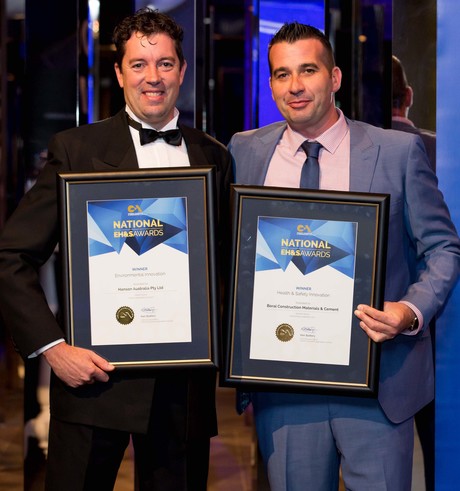Construction materials industry innovations recognised at CCAA awards

The national winners of the 2016 CCAA Environment, Health and Safety Awards have been announced at the Construction Materials Industry Conference gala dinner in Melbourne.
The Environmental Innovation Award went to Hanson, for a power-generating downhill conveyor installed at its Hobart Quarry, while the Health and Safety Innovation Award was given to Boral Construction Materials and Cement for its autonomous inspection unit, developed and deployed at its Seaham Quarry in the NSW Hunter.
CCAA Chief Executive Ken Slattery said the awards demonstrate the heavy construction materials industry’s commitment to best practice in environmental and health and safety performance.
“By shining a light on these initiatives, we’re providing ideas and solutions that can be adopted not just within our industry, but beyond,” he said.
Hanson’s power-generating downhill conveyor was created due to a need to shift rock from new reserves at the top of a hill, to an existing secondary/tertiary and screen plant at the bottom.
The conventional approach would have required workers to haul the rock using three 50-tonne dump trucks over a 2.5 km return cart.
Instead, the quarry team opted to use conveyors and harness the power generated by variable speed drives that, in effect, run in reverse when fully loaded and running downhill.
The power generated by this solution is also used to run other parts of the crushing and screening operation, which in turn reduces electricity costs across the site.
In addition, the conveyor solution saves an estimated 170,000 litres of fuel per year, as well as improving dust and noise emissions, by removing the haul trucks from the equation.
Boral’s autonomous inspection unit consists of a miniature remote-control vehicle fitted with an infrared camera, used to inspect screens and chutes as part of the company’s preventive maintenance inspection routine at its Seaham Quarry.
This initiative has removed the dangers to personnel associated with working in confined spaces, as well as resulting in a significant saving in inspection times, paperwork and training, virtually eliminating the need for high-risk permits and confined-space training.
Boral says the unit could be adapted to suit any industry where inspections are required in a tight space. The company is now looking at ways to further modify the unit so it can be used as an initial inspection tool for all its confined spaces.
The CCAA EH&S National Awards are held every two years and are contested by the winning projects from each state over the preceding two years.
Providing mental health support to young workers
Mental health is one of the leading reasons young workers do not finish their apprenticeships...
New psychology division supports organisational compliance
In recognition of the need to protect workers from psychosocial hazards in the workplace, Rehab...
Roof plumber dies after five-metre fall
The death of a 71-year-old roof plumber in October is currently being investigated by WorkSafe WA.







